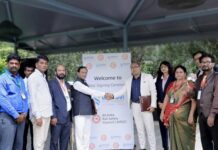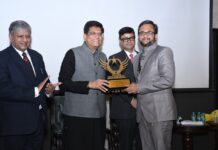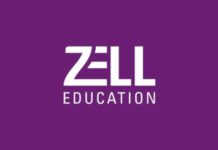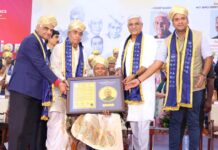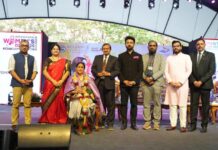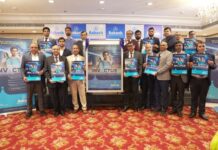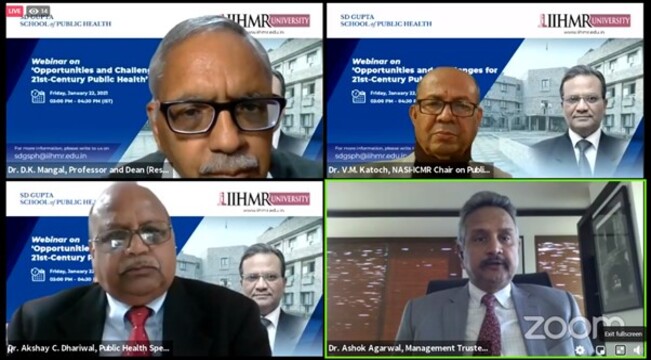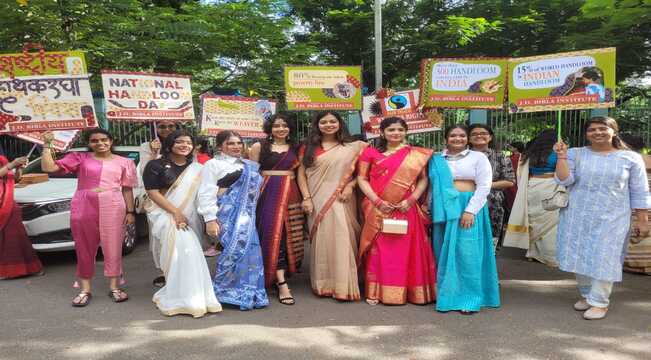IIHMR University Organized a webinar on ‘Opportunities and Challenges for 21st Century Public Health’
| · Major achievements in the 20th and 21st Century are timely eradication of Smallpox, Guinea worm, polio, neonatal tetanus, yaws, active trachoma free
· Drastic declines in Leprosy, malaria, lymphatic filariasis, kala-azar, HIV · Pandemics and outbreaks reported during the period were contained including COVID 19 and strengthening of surveillance and lab network · Multiple offshoots are being witnessed such as Bureau of Planning (BOP) has been weakened because of NPCC of NHM · There has been an effective decline in diseases when epidemiology and management have joined hand · Data Analytics and AI are key areas which would help the Public Health sector a great deal |
New Delhi, January 23, 2021: IIHMR University one of the leaders in higher education in healthcare and a Global Hub for Public Health scheduled a webinar on Opportunities and Challenges in 21st Century Public Health on 22nd January 2021. Considering the current situation of the Pandemic and the growing Public healthcare crisis across the globe needsa more comprehensive approach. IIHMR University recently launched the SD Gupta School of Public Health (SDG-SPH) to address various opportunities and challenges in the area of public health.
During the webinar, Eminent speakers such as Dr. Ashok Agarwal, Management Trustee and Founder IIHMR, Board of Trustee- Bhoruka Charitable Trust and Board Member of Johns Hopkins, Bloomberg School of Public Health USA, Dr. Akshay C. Dhariwal, Public Health Specialist, Government of India along with Dr. V M Katoch, NASI-ICMR Chair on Public Health Research at Rajasthan University of Health Sciences, Jaipur, President JIPMER Puducherry and AIMMS Madurai, Former Secretary Department of Health Research, Govt of India and Director General Indian Council of Medical Research, New Delhi discussed on key public health challenges and opportunities that would bring us closer to attaining the sustainable development goals 2030 . The webinar was moderated by Dr D K Mangal, Prof and Dean Research, IIHMR University Jaipur.
Dr. Ashok Agarwal, Management Trustee and Founder IIHMR said, “The disruptions in the healthcare sector have never been subtle nor have they arrived overnight. Public Health has never been complacent as there has always been a stir due to emergence of new diseases; experimentation of new therapies; educated patients; the rise of consumerism amongst health beneficiaries. This compiled with evidence-based decision made by both seekers and creators of health services; economies of cure; enhanced use of technology for universal health coverage. There must be action on Emergency Use Authorization (EUA) a great mechanism to facilitate the availability and use of medical countermeasures, including vaccines, during public health emergencies, such as the current COVID-19 pandemic. ” Dr. Agarwal shared his opinion that the public health sector has seen a greater channelization of funds and attention of Governments to healthcare all over the world due to the massive crisis created by the Pandemic and the warning that the globe again could be affected by such crisis now time and again. Thus, a globalized action agendas in the sector; empowered logistics and supply chain management would be the focal areas in which the experts must think and ponder upon. All the above aspects have led us to launch the S D Gupta School of Public Health to match up the vision of being agile and quick responding mainly on public health practices.”
During the webinar, experts came forward to discuss and share their views on the decade plan for achieving the SDGs.
Dr. Akshay C. Dhariwal, Public Health Specialist, Government of India, discussed major achievements of 20th and first 20 Years of the 21st Century like infrastructure under National Health Mission, advanced technology. Dr. Dhariwal said, “The major achievements in the 20th and 21st century in public health were Artificial intelligence, non-communicable and communicable diseases, climate change. These achievements also included giving tools to public health professionals for disease eradication, elimination and control which was done effectively by the epidemiologists. Guinea Worm eradication program was the best example where this disease was eradicated within limited human resources.”
While elaborating on the challenges Dr. Dhariwal said,“The challenges that outlay in future for public health must have a strong focus on Bioterrorism, Nuclear threat and Chemical Warfare. We have wonderful policies without having periodic review on implementation. There are various opportunities like Swacchh Bharat Abhiyan, Poshan Abhiyan, Fit India Campaign, Digital India campaign, Ujwala Yojna where we could have benefited to many public health programmes. National Disaster Management Authority (NDMA) and National Institute of Disaster Management (NIDM) under National Disaster Management Act 2005 could play an important part in the public health decisions; and NITI Aayog- Vision 2035 Document on Public Health Surveillance in India would play an important role where Public Health Surveillance must be on top priority. The NITI Aayog has identified about 117 districts on the basis of composite index for developmental activities. Issues such as malnutrition problem of Health Ministry or Women & Child Development Ministry, Dengue health problem or water management issue remained unresolved during this time frame and need a strong approach.”
Dr. V M Katoch, NASI-ICMR Chair on Public Health Research at Rajasthan University of Health Sciences, Jaipur, highlighted on the need of SD Gupta School of Public Health and elaborated to say, “IIHMR University has a unique model and has been given the credit of creating thinking people. IIHMR University trains people in the highest order from the point of view of technologies, how to deal with the pandemic and working in the filed with hands on experience. People in the public health sector must be trained for timely reaction, however the number of public health care professionals is very few. The SD Gupta School of Public Health would make a difference only if they are able to train public healthcare professionals to be strong in areas of health economics, social behaviour, clinical genetics, they must be able to think on the policies in the public healthcare sector etc. Dr S D Gupta School of Public Health would be a school for people who would be future thought leaders and not just a school to train Public Health specialists.”
The Public health has played a key role in creating improvements in health status globally. However, this is also true that it has not given due weightage as compared to curative aspects of health. As a result, improving of quality of life is remained a slow progress. There is a need for a more comprehensive vision for public health and the strengthening public health to face the challenges of the 21st century. With a vision to support the growing necessities, challenges and opportunities in Public Health, IIHMR University with an excellence in this domain launched the SD Gupta School of Public Health. SDG School of Public Health is established with twin objectives of creating, documenting, and disseminating public health knowledge amongst public health policymakers, healthcare providers, seekers, and the general public and to prepare future leaders and build public health capacity and skills with emphasis on public health practice to meet the challenges of the 21st century consequently bridging gaps in public health education and practices.
Corporate Comm India(CCI Newswire)





